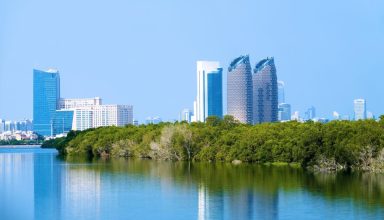Abu Dhabi named Arab Environment Capital for 2023

Abu Dhabi has been named Arab Environment Capital for 2023 by the Secretariat General of the Arab League and the Council of Arab Environment Ministers. The organisation recognised the emirate’s achievements in environmental protection and climate action over several years, led by Environment Agency – Abu Dhabi (EAD).
His Highness Sheikh Hamdan bin Zayed Al Nahyan, Ruler’s Representative in Al Dhafra Region and Chairman of the Environment Agency – Abu Dhabi (EAD), expressed his pride at Abu Dhabi being named Capital of the Arab Environment 2023, noting that the emirate’s achievements in the field of environmental protection and climate action is the result of the wise vision and directives of the UAE leadership, led by His Highness Sheikh Mohamed bin Zayed Al Nahyan, President of the UAE.
His Highness Sheikh Hamdan bin Zayed Al Nahyan said: “Abu Dhabi is a pioneering leader in sustainability, in full alignment with the UAE’s vision and commitment to fostering a sustainable and prosperous future. This was reaffirmed by the announcement of His Highness Sheikh Mohamed bin Zayed Al Nahyan, that 2024 is the Year of Sustainability once again.”
His Highness added that this award is a result of joint efforts by governmental and private bodies, sectors and institutions in Abu Dhabi in the field of protecting the environment and preserving its natural resources. This approach was inspired by the late Sheikh Zayed bin Sultan Al Nahyan, whose forward-thinking vision placed great importance on the need to conserve nature and protect the environment.
His Highness Sheikh Hamdan bin Zayed Al Nahyan said: “Abu Dhabi is consistently guided and inspired by the overarching vision of the UAE’s leadership, which is recognised worldwide for investing in knowledge-based initiatives that safeguard the environment and provide a sustainable future for generations to come.”
The Secretariat General of the Arab League named Abu Dhabi Capital of the Arab Environment for 2023 at the end of last year, in recognition of the emirate’s distinguished environmental protection efforts, and implementation of related initiatives and projects to improve people’s quality of life – all underpinned by the aim to achieve sustainable development and protect natural resources in the region. It is also an example of how the emirate’s dedication, efficient planning and the effective execution of wide-ranging sustainability initiatives can reap impactful results that will benefit generations to come.
Abu Dhabi won the competition organised by the Council of Arab Ministers Responsible for the Environment during its 34th session in Muscat last year, which coincided with two significant local and global events: the UAE declared 2023 the Year of Sustainability under the slogan Today for Tomorrow, and the UAE hosting COP28.
The agency prepared its award submission in cooperation with local partners, including Abu Dhabi Department of Municipalities and Transport (DMT), Abu Dhabi Sustainable Water Solutions Company (ADSWS), Abu Dhabi Agriculture and Food Safety Authority (ADAFSA), Abu Dhabi Waste Management Company Tadweer, and the Department of Energy (DOE).
Further cementing Abu Dhabi’s global environmental leadership credentials, the award submission outlined the most prominent achievements and initiatives implemented by the emirate, including: the development of green infrastructure, improvements in air and water quality, and the adoption of renewable energy and clean technology in all core sectors. The emirate has also launched a range of environmental awareness campaigns and programmes, motivating residents to take conscious measures to preserve the environment, as well as targeting students and the community to support environmental and sustainable projects.
Key achievements by Abu Dhabi included the emirate’s focus on climate change centred around reducing carbon emissions while adapting to its anticipated effects, and enhancing environmental awareness. The emirates’ climate action agenda includes various projects, such as: developing natural carbon sinks, planting millions of mangrove trees, converting transportation to low-emission alternatives, and diversifying energy sources. Other climate change measures also implemented in Abu Dhabi include replacing traditional lighting with smart street lighting to reduce energy consumption and carbon dioxide emissions, launching a mangrove planting initiative that disperses seeds using drone technology, and conducting an atmospheric research expedition to improve air quality and mitigation measures. The agency also launched the Green Industries eco-labeling programme to reduce industrial sector emissions, and created an index of farms applying climate-smart practices.
Abu Dhabi is implementing a comprehensive plan for land transport, low-emission vehicles, and traffic management in the emirate. Developed in 2009 to meet the city’s environmental, social, and economic goals, the Integrated Land Transportation Plan was updated in 2017 and again in 2022. The plan includes measures to reduce carbon emissions, such as creating public transportation infrastructure using renewable energy technologies, as well as innovative systems for operating buses using solar energy, and encouraging the use of alternative means of transportation, such as bicycles.
Abu Dhabi has made great efforts to combat land degradation caused by erosion and wind, creating forest areas to reduce sand encroachment and limit its impact on green spaces and air pollution. Strategic plans have also been developed to help urban cities mitigate and adapt to climate change, and Abu Dhabi’s Plan Maritime was developed to protect coastal areas and preserve their resources and marine habitats in a sustainable manner. A comprehensive soil survey project was also conducted to determine its various types, which revealed the suitability of one million hectares of land for irrigated agriculture. The first soil sample bank of its kind in the Arab world and North Africa was established to preserve soil samples and provide information about changes in soil quality.
Abu Dhabi also seeked to protect biodiversity and identify endangered species in the region, with a total of 3,453 species now registered in the emirate. Abu Dhabi is implementing a comprehensive programme to register new species and assess the protection status of each. The emirate launched the Red List of Threatened Species report and the Urban Biodiversity Index report, and reintroduced some endangered species back into the wild, such as the Arabian Oryx, the Scimitar-horned Oryx, the Dama Gazelle, and the Addax. In 2023, Abu Dhabi won a global award for its coastal and marine ecosystems rehabilitation programmes, and Bu Tinah Island was included on the UNESCO list of natural wonders, reflecting its efforts to preserve natural reserves.
Abu Dhabi manages the largest number of natural reserves in the Arab region, which cover 30.88 pe cent of the emirate’s total area. It also seeks to obtain international recognition for its terrestrial and marine reserve management systems by adhering to best global standards. The emirate manages 519 forests covering 200,000 hectares – 2.9 per cent of the emirate’s total area. Abu Dhabi is currently making its documented environmental data available to the public through smart applications, educational tools, and social media. The emirate is strengthening its environmental research programmes, and has discovered 20 new species. Abu Dhabi is also adding an aesthetic touch to cities and population centres to encourage more eco-tourism. source: biztoday


